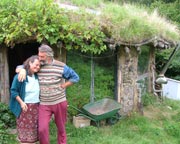
Wrenches – they’ll never give up
The first test of a new policy to promote off-grid housing in the Welsh county of Pembrokeshire has ended with a defeat for Tony and Jane Wrench who built a roundhouse in a beautiful field ten years ago and have been fighting the planning authorities ever since.
The Pembrokeshire planners decided earlier this month that the hobbit-style home is not suitable for the area, even though it is built entirely of natural materials and uses renewable energy and rainwater. The application for retrospective planning permission was declined on the grounds it could not make a positive environmental contribution and has an adverse impact on the semi-natural habitats in this location. The officers also stated that the development cannot meet the basic needs of the applicants in the long term, because of the yield from the woodland.
Tony Wrench told The Guardian newspaper he had thought the 30ft diameter home was to be the first success story in a radical experiment: last year Pembrokeshire county council and the Pembrokeshire Coast national park authority agreed to grant planning permission for off-grid homes in the council area – and even in the national park – if they met stringent criteria. It is an unusual policy that could encourage other planning authorities across Britain to rethink sustainable development: after all, these homes are affordable, carbon-neutral and can be built on green fields without environmental degradation.
Wrench was forced to fight his eviction from the moment council officers spotted the glint of his bus-window skylight during an aerial inspection. “An unsightly and incongruous appearance,” sniffed the first inspector to clap eyes on the Roundhouse. And to Wrench’s dismay his retrospective application for the Roundhouse was rejected last week.
Inside is a cosy jumble of books and ornaments, sheepskins and a wood-burning stove. Beneath their raised bed is a wine cellar, well stocked with Wrench’s sweet raspberry wine. The stove heats hot water for baths. They manage without a fridge or a washing machine.
A reedbed soaks up their grey water – the water left over after washing up, bathing and laundry – and a double-sided compost toilet is situated 20 yards from the house. Wrench, who carves wooden bowls for a living, finds adding the leftover wood shavings to the mix makes perfect compost. “Every year we get nine wheelbarrows of really good compost. It’s completely odour-free – the raspberries love it,” he says. “When you’re shitting it’s a creative cycle, rather than it going out to sea and becoming someone else’s problem.”
The authorities, however, see Wrench as a problem. Under the new criteria, he had to prove he could meet 75% of his needs – energy, food etc – from his smallholding; the planners decided there weren’t enough trees to support him. The Roundhouse was also rejected on environmental grounds.
Wrench will appeal. “They’ve set the criteria so they can say no to virtually anything,” he says. “Are we serious about sustainability, or are we more serious about value judgments about what looks pretty or not in a national park?”
Council planners introduced the low-impact policy after lengthy consultation – and some reluctance from the national park – when they realised they had no way of dealing with alternative dwellings like the Roundhouse. Peter Sedgwick, the council’s forward planning officer, says the criteria had to be tough but are not impossible to meet: “Planning guidance is against development in open countryside. This is an exceptional policy that only allows for it when the development can be seen as not just sustainable but positively contributing to things like biodiversity.”
Could other planning authorities follow Pembrokeshire? Sedgwick and Martina Dunne of Pembrokeshire Coast National Park believe Off-grid buildings will remain a “marginal” provision. Dunne says planners’ focus must be on affordable housing. Yet this is exactly what the off-grid builders claim to be (Wrench’s house cost just $9,000) but the planners don’t recognise it. “You couldn’t call it affordable housing as far as the majority of people are concerned,” says Dunne. “In a way, the ethos of low-impact developments – sustainability and sustainable design – should be mainstream. But if you ask people in the street, ‘Do you want to live that way?’, 95% of them say no.”
However, Wrench has another string to his bow – the Lammas cooperative, also in Pembrokeshire hopes to change the perception of Off-grid buildings as hippy dwellings. The project aims to build nine smallholdings near the village of Glandwr in Pembrokeshire (but not in the national park), and it will be the next test of Pembrokeshire’s off-grid policy this autumn.
Wimbush has invested $90,000 in the planning stage, in order to make sure that Lammas is a model low-impact community. “We want it to be mainstream,” says one of the community leaders. “We want normal people to come round and say, ‘I could live like that – they’ve got TVs and computers, and they aren’t toiling in the mud.'”
Lammas won’t need electricity or water from the grid, as it will get its power from a water turbine already on site, part of an old farm the cooperative has agreed to buy at agricultural rates if it gets planning approval. The project is not, however, about opting out of society. Residents will pay council tax and have mortgages. “We are deliberately taking a much more integrated approach,” he says. If approved, Lammas is determined to contribute to the local community: working with farmers’ markets and collecting compost from ordinary villagers.
So far, though, the project has met with local suspicion. Much of the opposition may be nimbyism, some could be cultural (of the nine families planning to take plots, only one is Welsh-speaking local) but a bit may also be indignation. Why should they get preferential planning treatment?